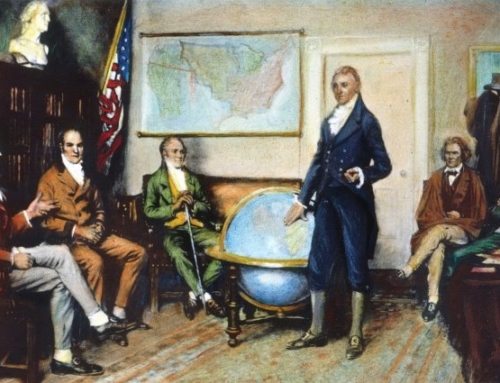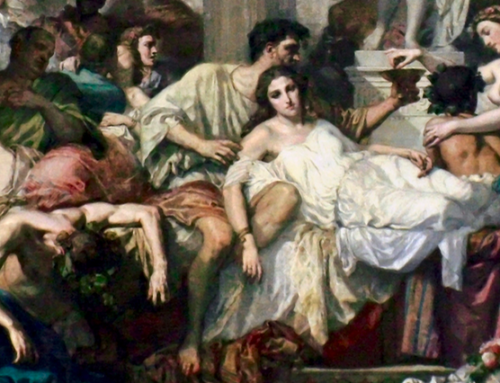That boredom, sexual perversion, consumerism, and the general malaise of the West are to a great extent the fruits of past economic growth is long recorded…
“Conquest or superiority among other powers is not, or ought not ever to be, the object of republican systems.” —Charles Pinckney of South Carolina
The Rise of Neo-Mercantilism.
If decadence is the loss of the proper object in life, then America is clearly decadent. Our lack of higher purpose to guide and inform public policy is evident in the ongoing debate over international trade and our relations with such countries as Japan and Germany, which is part of the general deterioration of economic integration predicted by German economist Wilhelm Roepke. With the apparent surrender of American industry to these and other foreign competitors in the last decade, the “free trade doctrine” has been challenged by various stripes of mercantilism. America, they say, must respond realistically, not merely to protect its economic and military strength, but to make America the world’s pre-eminent power. We need to increase exports and bring back and keep key industries in our own country. While there is both good and bad news in this approach, it is argued here that, ultimately, even a “conservative mercantilism” is not a good economic policy for a sound America.
The Good
Among the good aspects of the conservative mercantilist view is the simple realism which escapes the dogmatic libertarian who insists on absolutizing the free trade doctrine. A vigilant government is required for both domestic and foreign policy to maintain and protect legitimate national interests, and this implies a need to be mindful of the consequences of trade for America’s long-run economic future as well as for the non-economic aspects of national security, culture, and our identity as a people. For example, it makes no sense for America to remain vulnerable to Middle Eastern oil, and after three oil shocks, it is surely prudent to reduce that dependency through appropriate policies.
The Bad
However, there are three main errors conservative mercantilists make that finally render their approach unsuitable for a conservative or traditionalist base of public policy. First, they misunderstand the nature of a liberal or “free” economy with its free trade doctrine. In their dominant rhetoric, they vigorously reject “free trade,” equating it with nineteenth century economist David Ricardo’s law of “comparative advantage.” Secondly, their goals of increasing material growth and so economic and military power, and their love of country and its culture, are not compatible. Thirdly, their vision of what America is all about is contrary to any conservative conception. Their hero is Alexander Hamilton, not Thomas Jefferson.
What is a “liberal” or “free” economy? It is certainly not the laissez-faire or libertarian vision which some think-tanks in Washington, D.C. would promote. In their distorted version of things, a free economy is cast in the philosophy of social Darwinism and often overlies an implicit nihilism. Their advocates can’t really believe in any values except a bald egotism. In the context of such decadence, they literally believe anything goes in the economy and sometimes in morals. This is defended intellectually by an appeal to the more extreme versions of Austrian economic thinking that claim a Simon-pure capitalist system will always produce perfectly satisfactory results. If there’s anything wrong in the real world it’s always government, or some other outside corrupting influence. Mercantilists who wish to distinguish themselves from this drivel can be forgiven if they flatly refuse to truck and barter in a Disney world of “ostrich economics.” And yet such dogmatism is not reflected in the premier classical economist, Adam Smith, who’s justly famous for insisting that defense is more important than opulence but was neither a mercantilist nor had the instincts of one.
Rather, mercantilists must understand that their legitimate concerns are realizable within the classical free trade paradigm properly understood. Because shouting “fire” in a crowded theater is illegal, we don’t disclaim belief in “free speech.” We understand the prerequisites beneath responsible free speech are really only a concern for the welfare of all citizens. All freedom presupposes a corresponding and limiting “civic virtue,” no less for a free market than for a free republic. In fact, proper intervention by a vigorous state jealous of the welfare of its people is not simply fully consistent with the liberal free trade model but logically necessary. Policies that define when and how government is to intervene in economic freedom to prevent it from destroying its own prerequisites actually legitimize that freedom. The abuse of economic power, such as a monopoly keeping out smaller competitors, is precisely what government should prevent or remedy. When in 1982 the government failed to prosecute IBM for its predatory practices in driving out smaller competitors, it was arguably a major blow to the principle of economic freedom; certainly, it represented the Reagan administration’s lax views on anti-trust enforcement. Neither does free trade require private firms to compete with foreign (or domestic) governments. More broadly, protecting one’s cultural and ethnic heritage by imposing immigration restrictions can be perfectly consistent with “free trade.”
But such legitimizing interventions are possible only if there is a separation of government from normal market operations, or what Roepke referred to as the separation of political imperium from economic dominium. We call it decentralization, and the old metaphor of the umpire in the ballgame is not inappropriate here. Centralized or collectivist forms of governments such as National Socialism or Communism are characterized by increasingly blending economic and government functions and blurring the distinction further between society and state, between Caesar and all other human institutions and activities. Therefore, when mercantilists admiringly recommend that we more or less copy the Japanese model—closer cooperation between firms and with government—in order to respond to their economic penetration of our markets, they are asking us to betray this tremendous achievement of Western culture, to become, as it were, oriental.
This is especially important in view of the pragmatism which necessarily follows from mercantilists who, by a wholesale rejection of the free trade doctrine, are left without any guidance in international exchange other than the coherency provided by a desire to expand national power and perhaps the habit of following certain existing laws. Free trade, they claim, is useful sometimes, such as directly after World War II, but it isn’t any more. We are freighted with bad policies like the set of “archaic ‘antitrust’ laws” which are, as one mercantilist writes, “better fitted to the medieval fairs than to the modern world economy.” Times have changed and so must we.
At the heart of this pragmatism is the rejection of the Ricardian concept of “comparative advantage.” This doctrine of classical economics claims that in international trade (as with trade in a country or a region) there will be mutual gains from a division of labor between distant territories (and so very often, though not always, nations). Let each country do those things it does best and trade with others for the remaining things it wants. But mercantilists insist this means letting go of industries that, while they may be uneconomical to pursue at the moment, could be important in the future, for example, the ability to capture spin-off discoveries. The key is to retain industries with potential for future growth lest these be permanently or temporarily lost to the economic or military detriment of the country. Comparative advantage is an outdated, static concept unsuited for a “dynamic” world of mobile capital, where many industries can be set anywhere in the world. What need is there to specialize and trade? Examples are then cited from modern industry, especially electronic computer components, along with familiar references to the auto industry. Historically, the removal of the Corn Laws (1846) is cited as evidence that Britain’s free trade policy ruined its agriculture, driving more Britons off the land to join the ranks of the “urban proletariat.” Free trade is destructive.
Yet, they seem to admit reluctantly that Ricardo’s doctrine of comparative advantage is still useful. Their own examples confess that America has insufficient oil for its needs and Saudi Arabia can’t provide its own food, so the two countries concentrate on what they can do well and trade; and South Africa has a comparative advantage in critical raw materials which we need. Such an admission is important since it suggests the need to reconcile, rather than repudiate, the Ricardian doctrine with at least some of mercantilists’ legitimate concerns.
For example, one can adjust Ricardo’s doctrine to accommodate possible changes in productive capacity—”dynamic” comparative advantage as it is called in the literature—which does nothing to affect its essential truth. Aside from natural endowments, there remain other costs (sacrifices) associated with any industry which are related to a country’s history, culture, and previous experiences; the very things that neo-mercantilists rightly argue preclude a uniform global economy also preclude comparative costs from being zero or negligible. For a country to promote an industry it still must give up not just money, but some other industry that could be promoted. To get that other industry’s products it must trade. Preserving these possibilities is nothing more than what environmental economists long ago called “option value”: conservation practices involve greater present costs but allow a fuller range of choices in the future. But no matter how diverse, say, a farm is, it still involves trading and a level of specialization. There are still comparative advantages for it.
Though mercantilists are fond of citing examples from the 17th century (e.g., the decline of Dutch national power), the seventeenth century, as well as the entire mercantilist era, was hardly admirable. With the rise of modern nation-states the international economy of the Middle Ages collapsed and ushered in a period of Machiavellian business, politics and the general anarchy of economic warfare. Between 1600 and 1667 there was only one year of peace among the major European powers. Economies were less differentiated and much of European history thereafter revolved around efforts to overcome this problem.
These efforts were rewarded in the 19th century. Between 1815 and 1914, Europe and other nations enjoyed a remarkable period of relative peace. It had a lot to do with free international trade, respect for international law, and a reasonable division of labor among nations (i.e., comparative advantage). British agriculture suffered, not from free trade, but from large landed estates, the same lati fundia problem that destroyed Rome. By 1846, the year of the repeal of the Corn Laws, its agriculture had been denuded of its healthy peasantry and small proprietors, a result aided and abetted by mercantilist policy. Already as early as 1770, Oliver Goldsmith could lament in his famous poem, The Deserted Village: “But a bold peasantry, their country’s pride, / When once destroyed, can never be supplied.” Increasingly, only tenant farmers and their rural workers were left on the land; and the Corn Laws benefitted primarily the aristocratic landlords. Their repeal was more of a coup de grace: “rural proletarians” were driven from the land to the city to become “urban proletarians.” In Denmark, by contrast, free trade during the latter part of the century and healthy peasant agriculture flourished together. In Germany, meanwhile, free trade was abandoned in favor of Bismarck’s tariff policy (1879) and German agriculture was correspondingly damaged.
In the U.S., after the defeat of the South in the Civil War, American protectionism grew unchecked, contributing significantly to the formation of monopolies and trusts. The social and environmental consequences in general, and the deplorable influence exerted on American agriculture during the Gilded Age make for dismal reading. Though President Cleveland pointed out that protective tariffs were the “mother of trusts,” Republicans were so wedded to protectionism that they had to devise a way to retain tariffs while controlling trusts; the seldom-used “answer” was the Sherman Anti-Trust Act of 1890.
Ultimately, the growth of mercantilist policies during the latter part of this otherwise promising era of international trade contributed significantly to the collapse of peaceful relations, which such trade presupposes, and so to the Great War. Since then, the nations have not been able to achieve international integration again and are now, after a brief post-World War II respite, floundering around talking of regional trading blocs and various trade associations.
Finally, if Japanese trading success is “dependent upon access to markets more open than its own,” then when other nations follow suit there will eventually be no open markets to penetrate. As nations integrate governments and economies more, the international order disintegrates more, as seen in successive rounds of protectionist wall-building. The world economic trade becomes increasingly unstable erupting into crises and shortages, and even foreign exchange interventions to achieve national objectives of employment and economic growth, just as in the protectionist interwar period. Many countries will retaliate and others will simply feel compelled to go along the double treadmill of unlimited economic expansion and protectionism for fear of being left behind or outgunned; and national frustration and insecurity will grow. As Roepke reminds us: Disease, not sanity, is contagious.
But the same dog-eat-dog power games that bring divisive changes between nations, also visit divisive changes within them. These changes expose the second major flaw of conservative mercantilists: the inconsistency of their goals. If they are rightly concerned about certain outcomes of trade at the international level, they should also be concerned about them at the national and local levels, asking, as the late Russell Kirk did, what the cultural and moral effects are on American life from endlessly increasing material growth. How are their traditional values and their commitment to unlimited growth compatible? Indeed, how is the commitment of endless increases in per capita consumption consistent with Christian teaching?
British economist E.J. Mishan identifies the per capita “growth” ideology as the source of the post-World War II phenomenon of “rising expectations.” Aside from being the primary cause of inflation in this age, in contrast to earlier periods, growth has become, he writes, the “monomania” and “obsession” of every government. Mercantilists, too, are as much obsessed with growth as most, if not all, of their libertarian counterparts.
But just as it is unrealistic to overstate the harmony between nations, so also it is unrealistic to overstate it between culture and endless technological change. Why is it deplorable if U.S. workers lose their jobs in the semi-conductor industry to the Japanese, but it’s quite all right for them to be displaced by automation? Why should workers be diligent to retrain when their new skills will also become obsolete in a few short years? Unlimited economic growth renders not only skills but entire ways of life obsolete. Furthermore, as we acquire more goods over and above the basics of food, shelter and clothing, we compete for those things which only a few can have but not all, like an acre of secluded lake frontage. That boredom, sexual perversion, consumerism, and the general malaise of the West are to a great extent the fruits of past economic growth is long recorded by conservative thinkers such as Russell Kirk, Wilhelm Roepke and Richard Weaver. Yet, conservative mercantilists blithely continue to recommend more of the same.
Also, economic growth makes an abstraction of the very nationhood so much admired by mercantilists. It not only disturbs our life, but it also weakens affections for our country. It’s hard to love Wal-Marts, parking lots or silicon chips. We watch TV shows from around the world, travel by jet, communicate by phone and fax anywhere. These devices bypass borders as if they didn’t exist. As one author writes: “capitalism cannot be conservative in the true sense as long as its reliance is upon industrialism, whose very nature it is to unsettle any establishment and initiate the endless innovation of technological ‘progress.'” Even Adam Smith, hardly the apostle of industrial capitalism some take him to be, spoke favorably of small farmers and was quite critical of “projectors” (innovators). Is it not naive to harness such already-too-attenuated emotions to increase the very forces that will undermine them still further? Striving for the economic “edge” through material growth is surely the road to cultural seppuku.
In this context the appeal to American “economic patriotism” involves the very fusion of imperium and dominium whose separation we should be eager to preserve. If a genuine patriotism were sought, one should hear not rousing calls for expanding cornucopia via big corporations/big government partnerships, but for (economic) sacrifice. If Japan is to be defeated in this economic war, let us give up buying their consumer electronics; if our dependency on OPEC makes us vulnerable, a loss itself arising from past growth, let us reduce our oil consumption. But mercantilists want Americans to continue consuming these things—only from American producers.
The third major flaw with mercantilists is their wrong vision of what America is all about. For them, America means empire-building through the consolidation and militarization of economics. But originally, America was founded on the idea of “civil freedom” based on a settled way of life, not military and economic “pre-eminence,” imperialism, or world conquest. As Richard Weaver explains: “The Constitution was, especially in its bill of rights, a creation of eighteenth-century classical liberalism, which looked upon the freedom of the individual from state coercion as the highest political object.” In fact, the American War of Independence was itself arguably fought to oppose the tyranny of British mercantilist policies. Certainly, its watchwords were “Liberty” and “Independence,” not “union” and “pre-eminence.” But in 1830, the hitherto largely recessive evil of nationalist power reared its head in the person of Daniel Webster who argued for “union,” consolidation, and an expanding economy. His opponent, Senator Hayne of South Carolina, like most Southerners, wanted free trade and the keeping of their traditional way of life, the precondition of true liberty. Unfortunately, the empire-builders won, a fact which changes nothing about the original purpose and vision of the founding. Indeed, the history of the policy rather inclines us to affirm again the classical view.
As to the effort of some to make Alexander Hamilton a hero of a conservative mercantilism, Russell Kirk’s assessment of him may serve as an adequate reply. Hamilton “was not really a conservator of old ways, but a planner of a new order: the industrial and consolidated America which he intended to create truly was a more radical vision than any of Jefferson’s, and a public suspicion that Hamilton was somehow alien to the political tradition of America barred him from the presidency.” For these reasons, the conservative, says Kirk, is ill-advised “to make Hamilton into the founder of our conservative politics.” Need we add that the modern history of Germany can be seen as a didactic exercise in the consequences of the Hamiltonian system as applied by his admiring pupil, Friedrich List, and further by Bismarck?
The Direction of Policy
The direction for international trade policy should begin by remembering the purpose of an economy: to provide material security and private contentment. Traditional Christian teaching involves a principle of economic subsidiarity like that of political subsidiarity: One moves up to the next higher level of economic action only when the lower one fails. Instead of big economics which implies big government, we should imitate Randolph of Roanoke and fight for the “dignity and autonomy of the smaller unit.” Security, which mercantilists themselves rightly value, and contentment are best supplied by increasing the area of self-sufficiency of the “smaller unit,” the home, making it more productive. Many domestic and international economic problems are solved or reduced by making households less dependent on market exchange (not more dependent on domestic markets and less on foreign ones). This is done by increasing home production in foodstuffs as Solzhenitsyn recommends in his Rebuilding Russia (1991), in clothing, in education, in home repair, and by policies that reduce the mortgage payment time, and yes, even by a judicious reduction in consumption, and then, by increasing the distribution of productive assets ideally “to make every man a capitalist,” as it were, not a mere wage-earner. We must also revitalize small and medium-sized businesses and in other cases humanize industries and bring them to local communities. And finally, we must restore socially healthy forms of agriculture based on the labor capacity and skills of a single family, not on agri-business.
A family that is debt-free (no mortgage, no big credit card payments) and partially self-sufficient is in a superior position to withstand recessions or variations of international trade. It will need little, if any, public assistance. It finds greater satisfaction in work. Internationally, this means that less will be demanded from the market, hence a natural lessening of international trade which is already too intense but at the same time an increasing resilience with the volume of trade that remains. Household production and international markets can act as flywheels for one another in times of economic imbalance: a surplus in one area can counter a deficiency in another.
Internationally, an economic policy proper to the American tradition would first of all preserve the separation between the political and economic spheres as explained above. Massive interlocking of companies and tight cooperation with the federal government to pursue a militarized growth and make America “pre-eminent” is not the aim. Instead, it should pursue a vigorous application of the principle of anti-trust to all firms, foreign and domestic, located within the country. Or possibly, outlaw the existence of monopolistic enterprises, and prosecute offenders under civil law.
At the same time we should work constructively toward international economic integration where possible, working to re-establish those prerequisites of international harmony which the classical economists could so comfortably assume, but which we cannot. These include pursuing multi-lateralism, not bi-lateralism or closed regional trading blocs (with their corresponding implications for national sovereignty), working to improve respect for international law, the law of nations and the sanctity of treaties, and to restore a stable currency.
We also need to engage in a form of “growth detente” or containment and move away from this addiction to unlimited material expansion which is impossible to sustain environmentally and socially. By lowering the stakes in this irrational game, we ease the tensions in international trade and reduce the assault on our own culture and environment as well as on others. Or, by all means let us have “growth”—in the consumption of neighborliness, community, and social stability, and a genuine economic independence, a major prerequisite of an independent republic.
Such is the very radical program that addresses international trade problems at their origin, by affecting appropriate change on the internal economic structure first. And though it is laughed to scorn by the “hysterical optimists” of materialistic progress, a fair reading of history and human nature reveals that they are the utopians, the obscurantists, the day-dreamers who think the present path can be pursued endlessly and beneficently. Hard-headed reasoning points in a very different direction, as outlined above. And so far as mercantilism is concerned, even of a conservative kind, Roepke’s conclusion of the matter five decades ago is still correct: “Either we will have to be prepared for the nations unleashing…a terrible perpetual war for political domination of the entire globe; or, the barriers erected by short-sighted egoism will have to be torn down again. It can only be the one or the other: an unending scuffle for the greatest possible expansion of the closed territories, or return to the ridiculed principles of a liberal world economy…” Amen to that.
This essay appeared in The Legacy of Wilhelm Roepke: Essays in Political Economy by Ralph Ancil. Republished with gracious permission from Wilhelm Roepke Institute, which holds the copyright of this essay.
The Imaginative Conservative applies the principle of appreciation to the discussion of culture and politics—we approach dialogue with magnanimity rather than with mere civility. Will you help us remain a refreshing oasis in the increasingly contentious arena of modern discourse? Please consider donating now.







Leave A Comment